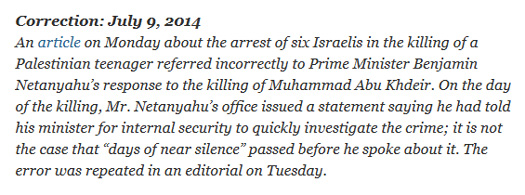Subtitled “Can Israeli and Palestinian Leaders End the Revenge Attacks?”, the editorial ought to have been particularly precise in reporting the leaders’ respective words and deeds. And, yet, the author/s grossly erred: “On Sunday, Prime Minister Benjamin Netanyahu of Israel, after days of near silence, condemned that killing and promised that anyone found guilty would ‘face the full weight of the law.’”
Netanyahu did not remain silent for days concerning the murder of Muhammad Abu Khdeir. The Israeli prime minister spoke out against the killing of Abu Kheir from July 2, the very same day of the murder. As The Times’ own Isabel Kershner reported: “On Wednesday, after the body of the Palestinian teenager was found in the woods, the prime minister called on Israelis to obey the law, and asked investigators to quickly look into what he called ‘the abominable murder.’”
Netanyahu again denounced the murder Thursday, July 3 at the home of American Ambassador Daniel Shapiro during the July 4th celebration. As CNN reported:
Israeli Prime Minister Benjamin Netanyahu pledged Thursday to find the perpetrators responsible for the boy’s killing, an act Netanyahu described as “a despicable crime.”Netanyahu made the comment during a speech at the American Embassy in Tel Aviv where he and Israeli President Shimon Peres attended the annual July 4 Independence Day party.


While readers are treated to a four specific examples of Israelis succumbing to their worst prejudices, The Times does not identify even one single case of recent Palestinian incitement, of which there is no shortage. Palestinians celebrated the kidnapping of Eyal Yifrach, Gil-Ad Shaar and Naphtali Frankel with a social media campaign called “The Three Shalits” which went viral; hateful cartoons in a Palestinian Authority-controlled newspaper and on the Fatah Facebook page; and the distribution of sweets in Gaza. In recent days, Fatah, headed by Palestinian president Mahmoud Abbas, warned Israelis to prepare body bags and declared “We wish for the blood to become rivers.”After the grossly lopsided accounting, in which The Times deems examples of heated rhetoric worthy of specific mention only when uttered by Israelis, the “Paper of Record” reverts to its faux fairness, describing “an atmosphere in which each side dehumanizes the other.” The editorial closes with its formulaic parity: “These deaths should cause the two communities to think again about the need for a permanent peace, but the loss of four young men may not be motivation enough.”
